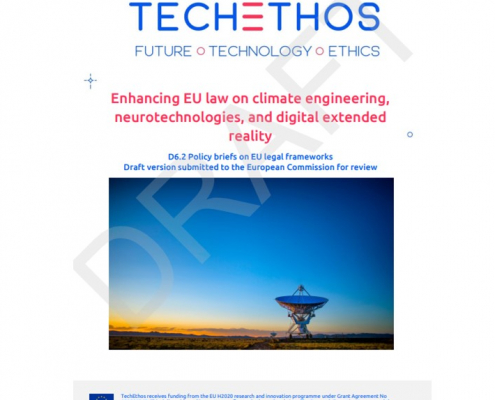TechEthos Publishes Policy Briefs on Enhancing EU Law on Emerging Technologies
TechEthos publishes recommendations on enhancing EU legal frameworks for new technologies that could impact the planet, the digital world, and bodily integrity.
In February 2023, TechEthos released four policy briefs targeted at enhancing EU legal frameworks for emerging technologies in the three families of Climate Engineering (Carbon Dioxide Removal and Solar Radiation Modification), Extended Digital Reality, and Neurotechnologies. These policy briefs, co-authored by Julie Vinders and Ben Howkins from Trilateral Research, were developed based on the analysis of International and EU laws and policies governing these three technology families, published as a report in July 2022.
The findings of this report were debated in a series of policy consultations with relevant EU officials, particularly those working at relevant Directorate General (DG) units and cabinets of the European Commission and involved in relevant legislative and policy development processes, held from December 2022 to February 2023, which then led to the identification of the regulatory priorities for the EU set forth as recommendations in the policy briefs.
Some key highlights from the four policy briefs are shown below.
Enhancing EU legal frameworks for Carbon Dioxide Removal (CDR):
- Clarify the role of CDR, a type of climate engineering technique that removes atmospheric carbon dioxide and stores it in geological, terrestrial and oceanic reservoirs, in meeting the EU’s legally binding target of net-zero by 2050
- Carefully evaluate wider socio-economic implications of CDR, including but not limited to fundamental rights, biodiversity, international development, international trade, food production and food security, short- and long-term cost implications, and energy security
- Devise robust sustainability requirements for CDR, particularly those in the context of the Sustainable Development Goals (SDGs)
Enhancing EU legal frameworks for Solar Radiation Modification (SRM):
- Investigate whether further research into various types of SRM, a type of climate engineering technique that aims to reflect sunlight and heat back into space, should be conducted, and determine the conditions, if any, under which SRM research in general, and especially any open-air testing, could be conducted
- Focus on both the large-scale SRM activities with the purpose of moderating the global climate system as well as the cumulative effect of small-scale SRM activities conducted for purposes other than the moderation of the global climate system
- Collaborate internationally and evaluate existing international governance regimes
Enhancing EU legal frameworks for Digital Extended Reality (XR):
- Include the protection of fundamental rights, such as the right to dignity, the right to autonomy, the right to non-discrimination, the right to privacy, and the right to freedom of expression, as a central consideration in assessing the risk factor of AI-enabled XR technologies
- Recognise that the immersive and increasingly realistic nature of XR technologies, which include advanced computing systems that can change how people connect with each other and their surroundings through interactions with virtual environments, may exacerbate the risks and impacts of harmful online content consumed through XR, particularly by special category groups such as children
- In addition to the Code of Practice on Disinformation, the EU should encourage the adoption of similar industry-led self-regulatory codes addressing issues associated with harm to XR users, including hate speech, online violence, (sexual) harassment, and mis- and disinformation
Enhancing EU legal frameworks for Neurotechnologies:
- Monitor and assess the possible under-regulation of consumer and dual use neurotechnologies (devices and procedures used to access, monitor, investigate, assess, manipulate, and/or emulate the structure and function of the neural systems of natural persons)
- Recognise and define putative neurorights, such as the “right to cognitive liberty”, prospectively, through the adoption of a Declaration on Neurorights and Principles, similar to the European Declaration on Digital Rights and Principles, and include them in the human rights frameworks
- Adjust and promote the more effective enforcement of existing legal frameworks
You can also find a report consolidating the recommendations in the four briefs here.
——
TechEthos is led by AIT Austrian Institute of Technology and will be carried out by a team of ten scientific institutions and six science engagement organisations from 13 European countries over a three-year period. ALLEA is a partner in the consortium of this project and will contribute to enhancing existing legal and ethical frameworks, ensuring that TechEthos outputs are in line with and may complement future updates to The European Code of Conduct for Research Integrity.





